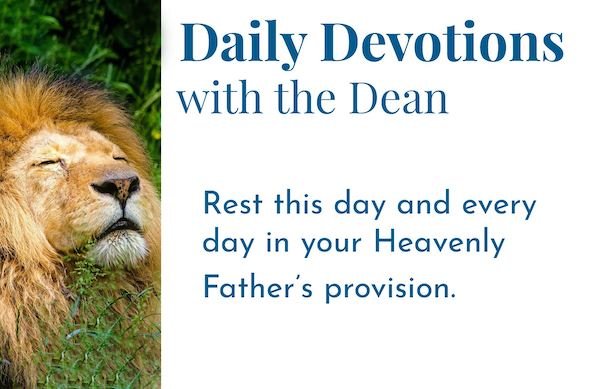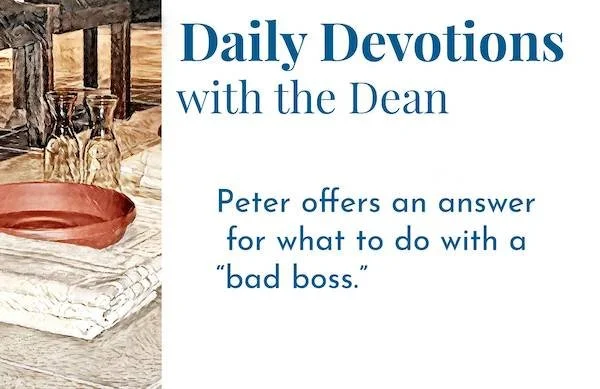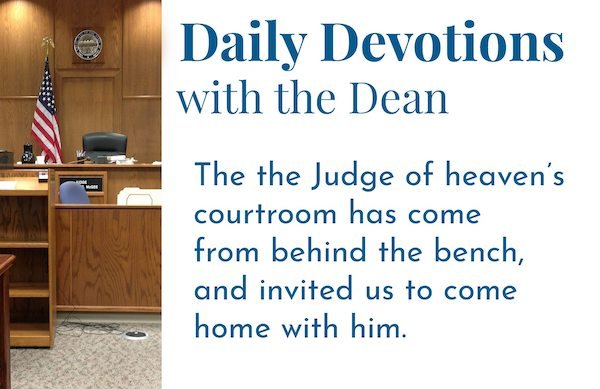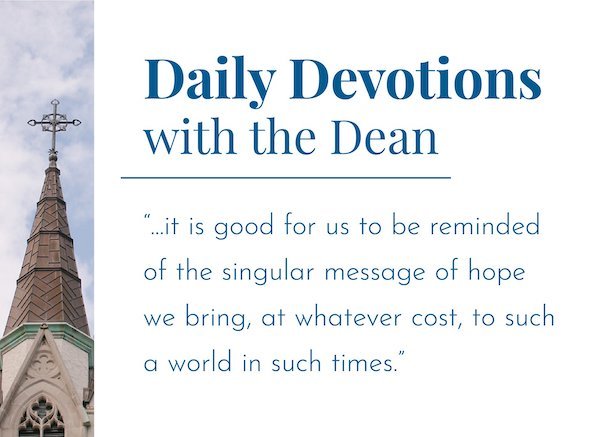Monday • 4/15/2024 •
Monday of the 3rd Week of Easter
This morning’s Scriptures are: Psalm 25; Exodus 18:13-27; 1 Peter 5:1-14; Matthew 1:1-17; 3:1-6
This morning’s Canticles are: before the Psalm reading, Pascha Nostrum(“Christ Our Passover,” BCP, p. 83); following the OT reading, Canticle 9 (“The First Song of Isaiah,” Isaiah 12:2–6, BCP, p. 86); following the Epistle reading, Canticle 19 (“The Song of the Redeemed,” Revelation 15:3–4, BCP, p. 94)
Today is Monday of the Third Week of Easter
This week’s readings in the book of Exodus, to my mind, mark a summit in the story of God’s relationship with his people. Tuesday, Israelites will arrive at Mt. Sinai, where Yahweh will declare to them their identity as “my treasured possession.” Wednesday, Yahweh will manifest his awesome presence and set a boundary between himself and sinful people, inviting only Moses the mediator to approach. On Thursday, Moses will receive the Ten Commandments, a summary of God’s law of life. On Friday, we will get a window into worship that enables fellowship between the Lord and his people, a pattern of Word and Sacrament. And Saturday will find the Lord giving instructions about how to build “a sanctuary, so that I may dwell among [you].”
…[T]he task is too heavy for you; you cannot do it alone. — Exodus 18:18b. At first, today’s reading in Exodus looks mundane by comparison. It’s just Moses’s father-in-law, Jethro, offering Moses advice about how to build a sustainable life in his ongoing role as mediator between the Lord and the people of Israel. First, Jethro tells his son-in-law to focus on his main tasks of taking the needs of the people to the Lord and bringing the teachings of the Lord to the people. For me personally, I couldn’t be more grateful for this reminder. Secondarily, Jethro tells Moses he should act as judge only in complex cases of conflict among the people. To adjudicate lesser cases, he should appoint “able men … who fear God, are trustworthy, and hate dishonest gain.” Again, for me personally, I couldn’t be more grateful for the capable, godly, and dependable people around me.
Image: Pixabay
This is not mundane material at all. There’s great wisdom here for all of us: learning to focus on our particular gifts and calling, and then experiencing the humbling but also exhilarating joy of interdependence. That’s why, I think, this passage belongs in the flow of this week’s readings about the literal “mountain top” experience at Sinai. Living the Commandments and being a community of God’s “treasured possession” is going to be done when Israel leaves the mountaintop and goes back into “the wilderness,” because the Promised Land is still a long way off. Like the Israelites, we’re going to need each other for the journey.
Remarkably, the Exodus passage today is paired with a complementary section from 1 Peter. Today’s passage from the epistle closes out our reading of Peter’s incredible missive. Throughout, he has been preparing people for life “in exile” on their way to an “inheritance that is imperishable, undefiled, and unfading, kept in heaven for you” (1 Peter 1:1,4).
And all of you must clothe yourselves with humility… — 1 Peter 5:5b. Leaders must lead, and followers must follow. But everybody must do what they do “under the mighty hand of God.” Jesus had had to do some hard teaching to harness impetuous Peter, but the lessons stuck. Now he passes them along to us.
Cast all your anxiety on him, because he cares for you. — 1 Peter 5:7. Peter understands that the whole era before Christ’s return in glory will be one in which his people learn to share their Master’s sufferings. Peter sees the real prospect of an especially intense, if brief, period of suffering in the near future—indeed, Emperor Nero’s horrific violence against Christians in Rome. The apostle even senses the sinister hand of “a roaring lion, your adversary the devil” at work. Even so, Peter’s voice is a calming one. If he were here today, he might say, “God’s got this.” In fact, if he were here today in the midst of our world’s crises and chaos, I think he’d say the same thing he did to the Roman Christians facing persecution, “Cast all your anxiety on him, because he cares for you.”
I do pray that this day you will know God’s peace and comfort, and above all, the confidence that, as Peter says in 1 Peter 5:10–11, “after you have suffered for a little while, the God of all grace, who has called you to his eternal glory in Christ, will himself restore, support, strengthen, and establish you. To him be the power forever and ever.”
To him be the power forever and ever, indeed. Amen.
Be blessed this day.
Reggie Kidd+













